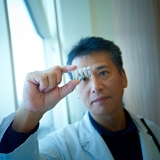Pseudotumor Cerebri Collaborative Clinic

If your child has been diagnosed with pseudotumor cerebri syndrome (PTCS), they need care from a variety of specialists to find relief. The Pseudotumor Cerebri Collaborative Clinic at Children’s Hospital of Philadelphia (CHOP) brings together neuro-ophthalmologists, an endocrinologist and a dietitian to manage your child's care.
PTCS, which is caused by excess cerebrospinal fluid pressure around the brain, can result in vision loss if it isn't treated. That's why it's critical to see specialists with expertise in this rare condition.
Members of our team are world-renown experts in pediatric PTCS — from both the hormonal-endocrinology and the ophthalmology perspectives. Together, they will address your child's symptoms and guide them on the path to recovery.
How we serve you
A thorough evaluation is the first step, to rule out other potential conditions and to uncover the cause of your child's PTCS, if possible. Treatment includes medication and, if needed, help making lifestyle changes so your child reaches and maintains a healthy weight.

Meet your team
Members of our team helped create the international guidelines to diagnose PTCS and are considered among the country's leading experts.

PTCS Research
The PTCS team has multiple ongoing projects aimed at understanding and improving ways to evaluate and treat children, adolescents and young adults with PTCS.

What to expect at your appointment
For your convenience, your child will see a neuro-ophthalmologist, an endocrinologist and, if needed, a dietitian all on the same day. See what you need to prepare for the visit.
Your donation changes lives
A gift of any size helps us make lifesaving breakthroughs for children everywhere.
